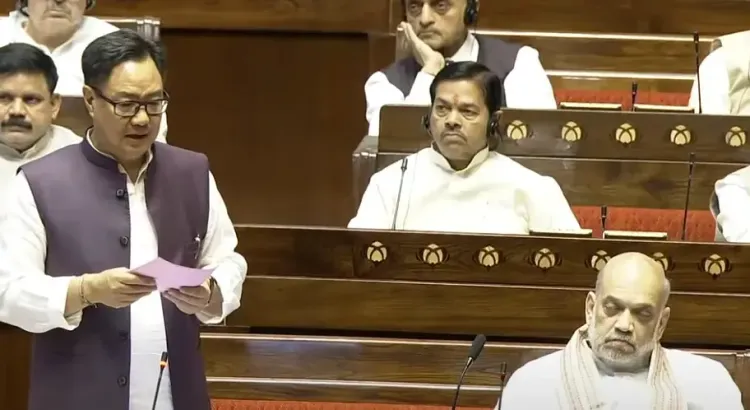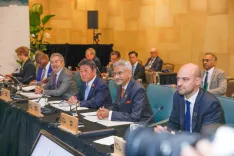Kiren Rijiju: Non-Muslims Excluded from Waqf Board Affairs

Synopsis
Key Takeaways
- Waqf Board management is exclusively Muslim.
- Bill enhances accountability and transparency.
- Proof of ownership required for Waqf designation.
- Over one crore suggestions received from the public.
- Government committed to long-awaited reforms.
New Delhi, April 3 (NationPress) Union Minority Affairs Minister Kiren Rijiju on Thursday refuted claims that the Waqf (Amendment) Bill, 2025, threatens the interests of Muslims. He emphasized that non-Muslims are not permitted to interfere in the operations of the Waqf Board, which is exclusively managed by Muslims and serves Muslim beneficiaries.
Rijiju addressed the concerns and criticism regarding the legislation after presenting the Bill in the Rajya Sabha.
He rejected allegations that the bill poses a risk to Muslim interests, asserting that the management, creation, and beneficiaries of the Waqf Board will remain solely in the hands of Muslims.
Refuting claims that the bill is unconstitutional or infringes on rights, Rijiju stated, "I categorically reject all these allegations. Any Muslim who wishes to manage their property through a trust can do so without restrictions."
He elaborated that the Waqf Board operates similarly to a Charity Commissioner, ensuring that Waqf properties are managed appropriately. The bill aims at enhancing accountability, transparency, and capacity building within the Waqf Board.
He highlighted that proof of ownership will now be a requirement before a property is declared Waqf, thereby eliminating the previous provision that automatically designated any claim by the Waqf Board as Waqf property.
Rijiju mentioned that the bill underwent extensive discussions before its introduction, during which over one crore memoranda and suggestions were collected from the public. A Parliamentary Committee also held consultations in ten cities: Mumbai, Kolkata, Ahmedabad, Hyderabad, Patna, Chennai, Bengaluru, Guwahati, Bhubaneswar, and Lucknow.
Referencing historical attempts to reform the Waqf Board, he noted the inquiry commission established by the Congress-led government in 1976 and the Sachar Committee Report of 2006, which recommended strengthening and digitizing the Waqf Board. At that time, there were 4.9 lakh Waqf properties generating an annual income of Rs 163 crore. The Sachar Committee estimated that, with proper assessment, these properties could yield Rs 12,000 crore annually. Currently, the number of Waqf properties has increased to 8.72 lakh, indicating a potential for much higher revenue.
Rijiju also referred to the findings of the JPC led by K. Rehman Khan, a former Minority Affairs Minister, which identified insufficient infrastructure, manpower, and funding in the Waqf Board. The JPC had recommended establishing a centralized data bank and structured leasing policies for Waqf properties.
He asserted that the Modi government is advancing recommendations that previous Congress and UPA administrations neglected.
Rijiju pointed out that the 2013 UPA government made attempts to reform the Waqf Board ahead of elections by forming a JPC with 13 members, conducting 22 meetings, and consulting 14 states. "In contrast, the current JPC comprised 31 members, convened 36 meetings, engaged with 284 delegations and organizations, and consulted 25 states, five minority commissions, along with multiple MLAs and MPs," he remarked.
The number of memoranda submitted has surged from 32 in 2013 to over one crore now, he noted.
Rijiju reiterated that the BJP government is committed to enacting these long-awaited reforms. "These committees were established during Congress and UPA rule, yet they failed to take action. The Modi government is fulfilling the recommendations that Congress did not have the courage to implement," he stated.
The Minister concluded that the bill guarantees improved accountability and efficiency in the management of Waqf properties, addressing longstanding issues while protecting the rights and autonomy of the Muslim community.









